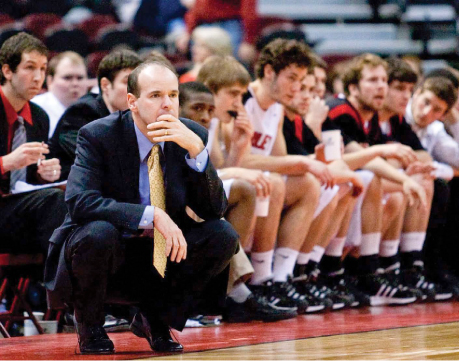
Bill Arden remembers a practice with the Carleton Ravens men’s basketball team when things weren’t going quite the way head coach Dave Smart liked them. The players weren’t taking things seriously enough or giving him the all-out effort Smart wanted. So, he told them to line up for a round of bump, the shooting game that’s a staple of Grade 6 gym classes. But what Smart had in mind wasn’t a whimsical return to childhood. When his players hesitated, confused about whether their coach was serious, Arden—one of Smart’s assistants at the time and still a close friend—recalls him screaming, “You want it to be happy world? Here’s your happy world! Go play bump and have fun. See if we win.” He forced them to line up and play the grimmest game of bump in the history of basketball.
In Dave Smart’s world, you do not win by having fun. You win by giving absolutely everything over to the game, by working harder in practice than other teams do in games, by savouring the sickly sort of motivation that comes from a loss, by watching hour after hour of game tape when sleep won’t come. Smart is a walking advertisement for the notion that successful coaches are, deep down, obsessive masochists. But he’s earned the complete loyalty and trust of his players while building a university basketball program that’s stomped competition across the country and established a ludicrous record of dominance. Smart’s Ravens have won nine national titles in his 14 seasons, the most all time (the title this year moved them past the University of Victoria Vikes). This season, he was named CIS coach of the year for the sixth time and Carleton’s record in the Dave Smart era stands at 365 wins and 31 losses, amounting to what the CIS calls “a mind-boggling winning percentage” of .922. His coaching skills have been in demand off campus, too: Smart coached Team Canada at the 2011 Pan Am Games and served as assistant coach for the Canadian senior men’s national team. Last spring, he was selected from among 105 applicants to run Great Britain’s under-20 men’s team.
Smart has done it all by demanding total commitment and excellence from his players—and nothing less from himself. “His singular focus on getting the best out of each individual—it’s inspiring, but it also borders on insanity,” says Arden. “And he would describe it that way, too, which is why I feel safe in saying it.” Smart’s Ravens play a complex technical game, and he runs his practices with the precision and intensity of a playoff contest. He expects his players to leave everything else in their lives at the door before they walk in and everything they’ve got on the hardwood before they leave.
That approach has brought an astonishing amount of success to his teams, but Smart isn’t one to bask in it; he dislikes the spotlight and his focus on his team doesn’t leave much time for speaking to reporters. In a recent, and rare, interview with The Score, he was asked how long he allows himself to enjoy big victories like last year’s CIS championship—Carleton’s second in a row, following their second consecutive undefeated regular season. He gave his players some time to soak it in, he said, but he immediately went back to wrestling with how to improve for the future—any time he takes to celebrate is time the competition is using to prepare to beat him. He hates the attention and potential for complacency that come with winning, Smart says, but he loves the extra drive that comes with a defeat. That’s why he’s re-watched every one of his losses “50 times” but he never looks at a win again. “[I just] let my paranoia take over and get back to work,” he said. “When we lose, it’s nice to watch and hear all the negatives and make sure that the motivation stays there.” Smart acknowledged that he’s had NCAA job offers, but restrictions on off-season work with players and the way recruitment changes team politics held him back. At one point, he’d overcome those concerns and was on the verge of accepting an offer, he said, but when the time came to tell his players, he just couldn’t walk away.
Smart started his basketball career as a high-scoring point guard at Nepean High School in Ottawa. He was a wily player who could set people up and fake well, and he displayed uncommon dedication for a teenager. “The competitive will to win—he used to stick around and play one-on-one after practice every night,” says Andy Sparks, Smart’s high school coach and now head coach of the women’s team at the University of Ottawa. After graduation, Smart planned to go to Carleton, but he blew out his knee trying out for the basketball team, so he instead replaced Sparks as coach of the Nepean team— leave it to Smart to go from playing for his high school team to coaching it in a matter of months. In 1985, he and Arden helped found the Ottawa Guardsmen, an elite competitive club program. Kevin Bellamy was 17 when he played on the inaugural team, coached by Smart, that won a provincial championship. “The intensity of it was pretty eye-opening. Once you realized that what he’s teaching works, he can demand a lot from you,” Bellamy says. “He’s a genius, is what he is—a basketball genius.” After a few years of immersing himself completely in coaching, Smart decided to go back to school and enrolled at Queen’s University. He played three seasons with the Golden Gaels in the early 1990s and was named an Ontario University Athletics all-star each year, but he’d already figured out that his place was behind the bench.
Queen’s passed Smart over for the head coaching job in 1994, but he landed an assistant coaching position at Carleton in 1997. He took over as head coach in 1999, with Arden as one of his assistants. In one of their early seasons, they had a player, Josh Poirier, who was great on the court but lacked discipline away from it. At the beginning of the season, they’d call him at home, wake him up and he’d stumble into practice late, over and over. Arden remembers Smart making Poirier stand and watch while his teammates ran punishment sprints on his behalf, reasoning, “We win as a team, we lose as a team. It’s not, ‘Josh loses.’” The message registered and Poirier got his act together; after graduation, he went on to play pro ball in Australia.
It’s ironic that Smart is so intuitively adept at sport psychology, because according to Arden he dismisses much of it as phony garbage. Coddling has no place in the Dave Smart system, and he believes in honesty to the point of comical bluntness. A few years ago, he gave a speech on leadership to a corporate audience, and he related a story about someone asking him in a coaching clinic if he treats all his players the same. Looking perplexed and annoyed, Smart explained why that wouldn’t be fair. “My players are all different. Some stink, some are good, some are idiots, some are nice guys,” he said dryly, while the audience snickered. Absolute honesty is one of the reasons his players respect and trust him, even as outsiders in the bleachers whisper they would never play for the purple-faced, vein-popping caricature yelling at the winning team. Smart speaks derisively of locker-room cultures where everything looks good on the surface and people say all the right things, but things get touchy if anyone gets in someone else’s face. He likes his teams to be a family of a different type: you scream at your brothers if they screw up, but you’ve got their backs no matter what, and they know it. “His big thing is it’s dishonest to give a guy a pat on the back and compliment him when he fell short of what he’s capable of doing,” says Arden. “What he develops with players is complete and utter trust. They trust that he will tell them the truth, good or bad, the second that he feels like telling them.”
When Smart recruited Elliot Thompson out of Fredericton, N.B., to play for Carleton starting in 2007, the coach’s reputation preceded him: “All I knew about Carleton was that Dave was nuts and that they won a lot. That was enough for me,” Thompson says. The shooting guard’s way of working hard was endless hours spent on his stroke, practising footwork and lifting weights. But one day in his first or second season, Smart called him into his office. He told Thompson that he’d reach a point he couldn’t push past with sheer strength and speed, but he could elevate his game by watching a lot more video, figuring out how to read the game and what an opponent was going to do before they’d even decided. It made him a smarter player. “People just see Dave as a hardass, but they don’t really see how much he cares about his players,” Thompson says. “I’m biased, but I’d say he’s the best coach there’s ever been in Canada.”
Plenty of people would agree, but you get the feeling Smart will never quite buy into the accolade. It’s that constant, gnawing hunger that’s allowed him to build his unparalleled basketball dynasty in the nation’s capital. He hammers into his teams the idea that there’s no such thing as good enough, but the restlessness comes from deep within Smart himself. Even now, having set the standard for championships won, he’ll allow himself only a brief moment to soak it in, and then it will be time to fixate on what needs to be done even more perfectly next season.

